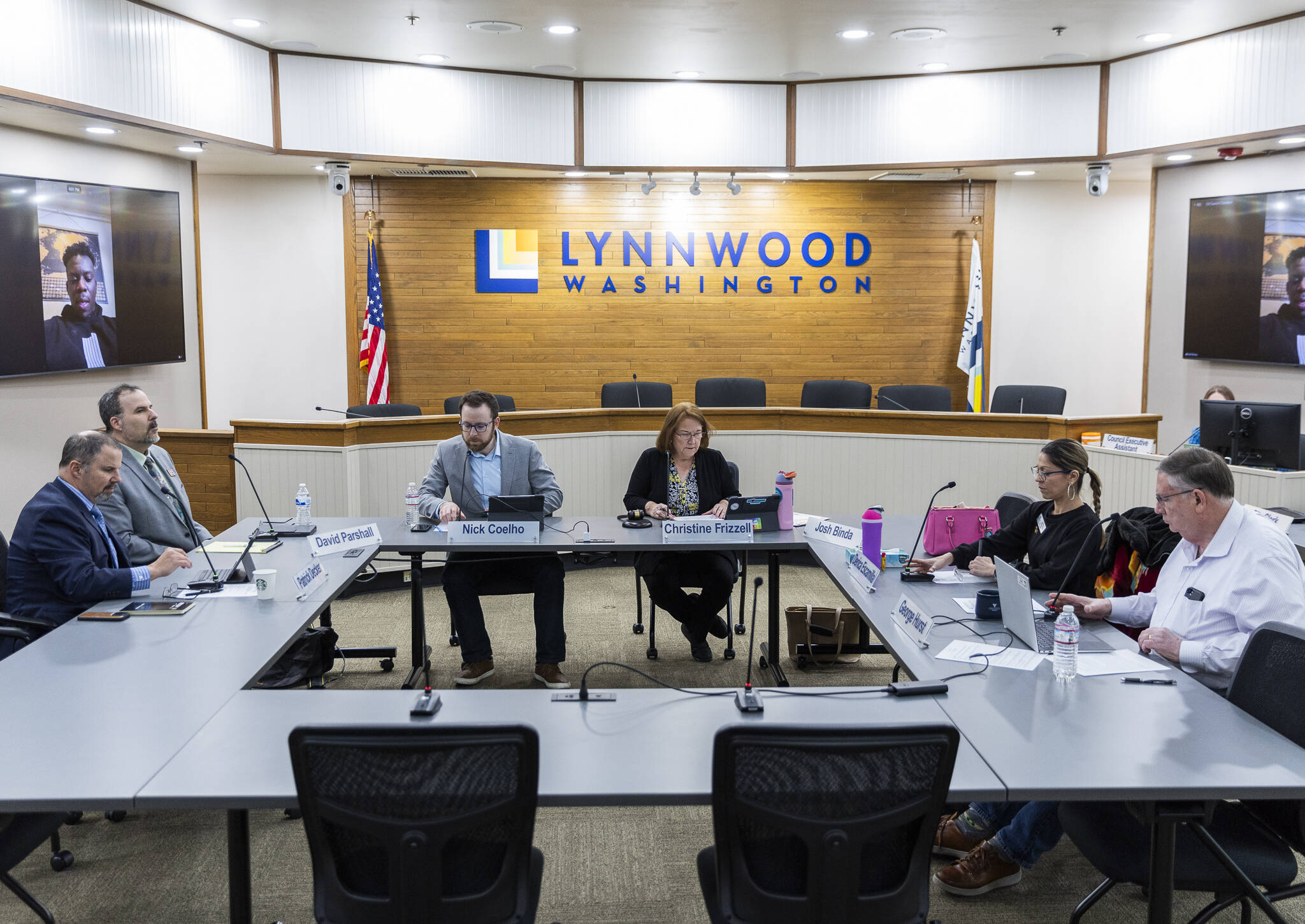EVERETT — The Lynnwood City Council adopted an ordinance Monday to clarify requirements to hold elected office after a series of local controversies regarding council member eligibility.
The ordinance explicitly states council members must live in Lynnwood for the entirety of their four-year term and maintain active voter registration. Each year, council members will have to provide an affidavit to the city clerk declaring their voter registration and residency status. Members are also prohibited from holding another paid elective office while serving on the council.
Council member Patrick Decker first proposed the idea of a residency ordinance in February after some community members called council Vice President Josh Binda’s residency into question. During his 2024 run for a seat in the U.S. House of Representatives, Binda listed an Everett address on several public documents. He was evicted from a Lynnwood apartment in 2023, and his voter registration was listed as inactive for a period of time. Binda denied the allegations that he did not live in Lynnwood.
In March, Lynnwood resident Dio Boucsieguez, who is now running for City Council, challenged Binda’s voter registration. In April, the Snohomish County Auditor dismissed the challenge, saying Boucsieguez did not have enough evidence to prove Binda didn’t live in Lynnwood.
Until now, Lynnwood’s municipal code did not specify residency requirements beyond state law. State law requires city council members to live in the city for at least one year prior to running for office. It also states that if a member is no longer registered to vote in the city, their position will become vacant.
Lynnwood’s ordinance has similar language, stating that if a council member does not live within city limits, they must “vacate their position immediately.” But the council isn’t able to enforce that without going to court, City Attorney Lisa Marshall said Monday.
“If the council member prefers not to show up and not to attend council meetings after the rest of the council has informed that council member they are no longer on council, they can choose to cooperate,” she said. “However, if the council member does show up and insists on sitting up on the dais and disagrees with the decision, then it would require a court action to remove the council member.”
Binda made a motion to get rid of the language because the council can’t enforce it. The motion failed 2-5, with Binda and council member Derica Escamilla voting in favor.
“If we don’t have this intent, at least, then there’s no standing toward anybody trying to challenge a council member who has violated the residency,” said council member George Hurst, who voted against Binda’s motion. “So I would agree that we need to continue to have this section in the ordinance.”
Council members are allowed to live outside of city limits for up to 120 days in the case of an “extreme hardship,” the ordinance states. In this case, the council member must submit a separate affidavit saying they intend to resume living in Lynnwood after the hardship. Decker had originally proposed a 60-day exception period, but the council unanimously voted to extend the period to 120 days.
Council President Nick Coelho proposed getting rid of the residency section altogether. The motion failed 3-4, with Coelho, Binda and Escamilla voting in favor.
“This whole section on residency is an answer in search of a problem,” Coelho said. “This is legislating on a very specific edge case. I really don’t like doing that as a rule.”
The council ended up adopting the ordinance unanimously.
The vote comes as an Everett City Council candidate, Niko Battle, faces similar eligibility questions. Last month, an Everett resident filed two separate challenges against Battle, one to his voter registration and another to his eligibility to appear on the ballot, alleging he does not live at his listed Everett address.
Everett’s legal department has yet to interpret ambiguous language in the city’s charter regarding certain voter registration requirements. A hearing for Battle’s ballot eligibility was scheduled for Tuesday afternoon.
At a Sept. 2 meeting, Decker said the questions facing Battle show the importance of clarifying Lynnwood’s city code.
“This is an example of why we need to focus on ambiguity in our language,” Decker said. “Already at this point, it seems that — regardless of how the election turns out and what is decided — there will be lawsuits, which is going to cost the city of Everett money because of the ambiguity in that code. I’d like to see Lynnwood avoid similar lawsuits now and in the future because those can get very, very expensive very, very quickly.”
Lynnwood’s ordinance also clarifies rules regarding council members holding multiple elective offices. In January, former council Vice President Julieta Altamirano-Crosby resigned from the council after facing scrutiny for being elected to the Snohomish County Public Utility District Board of Commissioners. At the time, Lynnwood’s code prohibited council members from holding any other elective office.
Some council members pointed to the Doctrine of Incompatible Offices as a reason to allow Altamirano-Crosby to serve on both bodies. The doctrine, which stems from a 1957 state Supreme Court decision, prohibits someone from holding multiple “incompatible offices” at the same time. Offices can be incompatible if they result in inconsistent loyalties to the public or if one office is subordinate to another, according to the Municipal Research and Services Center.
The new language adopted Monday specifies that, “irrespective of the Doctrine of Incompatible Offices,” council members are not allowed to hold another paid elective office, which includes PUD commissioners. Non-paid offices include school board members and precinct committee officers.
Jenna Peterson: 425-339-3486; jenna.peterson@heraldnet.com; X: @jennarpetersonn.
Talk to us
> Give us your news tips.
> Send us a letter to the editor.
> More Herald contact information.

























